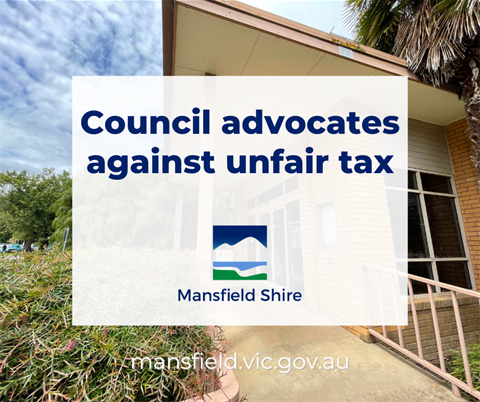Mansfield a voice against the ESVF
Published on 27 May 2025

Mansfield Shire has been a leading voice against the new ESVF tax with Council’s Mayor and CEO strengthening the united voice of all councils at the State Council meeting last Friday 16 May 2025.
Mansfield Shire Council Mayor Cr Steve Rabie and Chief Executive Officer Kirsten Alexander attended the State Council, held by the Municipal Association of Victoria.
In February 2024, Council made the unanimous decision to advocate against the tax. One of the advocacy measures was to resolve to put a motion to the MAV State Council to ask all 79 Victorian councils to band together against the tax. Many other councils also put a motion forward to MAV for the same consideration.
The motion was presented to all 79 councils, with Mansfield Shire Council and Benalla Rural City Council amending the motion to strengthen the opposition of the tax itself.
Mayor Cr Steve Rabie said he was grateful for the opportunity to be a strong voice against the tax.
“No council wants to collect the tax. It’s an unfair tax and it will be a massive burden not only on our communities but on our council organisations. We know that our community is going to be upset by the tax and our council customer service officers will be the ones they end up having to hand their money over to. We’re the only level of government with a front desk and our officers will be the ones to cop the frustration that should be directed at the state government.
“This is really very risky for councils. We are forced to pay on behalf of our community, which puts us in financial risk.
“I was really impressed that even the metro councils voted to support the motion, which highlights how it is unfair on rural communities. It shows that we are united in our view of this tax, even metro councils can see that even their communities will suffer,” said Cr Rabie.
Councils from across the state resolved to:
- Oppose Councils being the collector on behalf of the State Government
- State Revenue Office to collect the Principal Place of Residence (PPR) component of the ESVF, instead of councils
- Fully reimburse costs incurred by the local government sector for the collection, reporting and debt recovery services that it will provide
- Improve transparency and communication
- Ensure that the levy is equitably structured and does not disproportionately burden rural communities or primary producers
Mayor Cr Steve Rabie said Council was continuing to explore how to reduce the burden on the Mansfield Shire community.
“We are hearing you. We are exploring how we can deliver a clear rates bill that shows the impact of this unfair tax,” said Cr Rabie.
Comment from MAV President Cr Jennifer Anderson:
The MAV has worked hard to strongly oppose the Emergency Services and Volunteers Fund (ESVF) as councils should not be a collection agency for the state. It’s pleasing that our State Council has provided a united voice for the local government sector on the need to continue this advocacy and highlight the need for further reform of the ESVF.
The MAV recognises the importance of action on the ESVF to our sector, as the key issue discussed today and will continue this important work alongside the local government sector.
Comment from Pyrenees Mayor and MAV Delegate Cr Tanya Kehoe:
“It is not just some councils, the financial and mental impact on our entire farming community will be exponential.”
Full resolution:
Emergency Services and Volunteers Fund
The MAV expresses the local government sector’s disappointment with State Government's approach to levy collection and implementation of the Emergency Services and Volunteers Fund (ESVF) and opposes Local Government being a collector on behalf of State Government, and calls on the Victorian Government that if Local Government is to administer the funding then:
1. Adequate administration funding for local Government to manage the cost of administering the ESVF
2. Victorian Government to undertake the community engagement directly with communities
3.Transferring Levy Collection to the State
A) Transfer the responsibility of collecting the Principal Place of Residence (PPR) component to the State Revenue Office, ensuring streamlined and efficient collection while leveraging existing state resources.
4.Ensuring an Equitable Funding Model
A) Continue efforts to reduce the levy burden on all Victorian residents, ensuring the model remains equitable for all communities, especially rural areas and primary producers, reflecting the adjustments made to the Primary Production Land (PPL) rate.
5.Ensuring an Equitable Funding Model
A) Continue efforts to reduce the levy burden on all Victorian residents, ensuring the model remains equitable for all communities, especially rural areas and primary producers, reflecting the adjustments made to the Primary Production Land (PPL) rate
6.Improve Transparency and Communication:
A) Implement a comprehensive communication strategy to clarify the levy’s purpose, allocation, and impact on ratepayers.
B) Provide a publicly available statement detailing the reasons for changes to the fire services levy, including justifications for any fee increases from 1 July 2025.
7.Conduct an Ongoing Economic Impact Assessment:
A) Undertake periodic economic impact assessments to evaluate how levy changes, including adjustments to the PPR and the primary producer rebate,
affect residents, businesses, and the broader community.
B) Release findings publicly to ensure ongoing transparency and
facilitate informed decision-making for future policy revisions.
8.Ensure Equitable Fund Distribution:
A) Deliver a needs-based equalization approach for the distribution of ESVF funds, ensuring that rural and regional emergency services, which are disproportionately impacted by natural disasters, receive adequate and timely funding